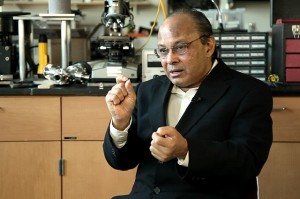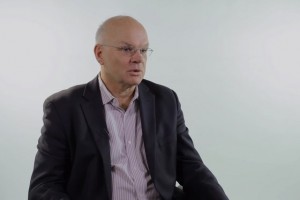Nanoscale Negative Materials for Optics
Physicist Srinivas Sridhar on super resolution imaging, an entirely new way for light to propagate, and a brea...
The most important thing, I think, about the future is to realize that we don’t know what it’s going to be, that we are in a world, which especially in the last century or two, has been changing very very rapidly. And, I think, most people don’t appreciate how fast the change has been, that a hundred years ago measles was a deadly disease, that a hundred years ago there was no cure for most diseases, that any doctor who, except for a few things, claimed he could cure you was a quack. And suddenly starting about the 1920s with the antibiotics and the sulfur drugs doctors suddenly became able to do what they were claimed to be able to do for 2000 years. And we’re all used to that.
I have a book called «Future imperfect» and the book can be bought in a bookstore (I don’t think there’s a Russian translation), and you can also read it for free from my web page, and I discussed this in much more detail.
The technology in the opposite direction is surveillance. The ability of having video cameras watching people and just having video cameras watching people doesn’t make that much of a difference, because people can watch people. But we also have technologies for recognizing faces and we have database technologies for organizing information. So we could easily have a situation 10 or 20 years from now where everything that happens in public spaces is recorded and findable. If somebody wants to know what were you doing at 3 p.m. last Saturday they just punch the right things into the computer and there is the picture on the screen of what you were doing. So that’s encryption could give us more privacy than we’ve ever had and surveillance could give us less privacy than we’ve ever had. Those are two of the important technologies that may change the degree to which people have liberty.
But there are other technologies. For example, one of the things we know much more about than we used to is the use of drugs. Drugs can be used not only for curing diseases, but for at least three other purposes that matter to people. One of them is for recreation, that people drink vodka or smoke marijuana or whatever, because they enjoy it. One of them is to improve your performance, that people take some things because they think they result in they’re thinking faster or being more wide awake. Or people drink alcohol because it relaxes them and some people find that they can function better when they are relaxed.
The third thing you can use drugs for is to control other people. So that some people try to get other people drunk in order to take advantage of them. It is likely as the technology improves that we will be better at doing all three of those things. And that means that you are going to have to worry about the possibility of the future where somebody can give you a drug that makes you believe them, a credulity drug. And you can even imagine a sufficiently ambitious government that put some such drug in the water supply in order that you will believe them.
So the point I’m trying to make is that we don’t know what the future is going to be like and there are many possible futures. Each of which is probably very different from the world we’re now living in and which will affect freedom in a wide variety of different ways.
There are some other important technologies which are less directly related to liberty, but also affect it. One of the very large ones that may happen is something called nanotechnology. The idea of that is that the objects human beings make. Even objects like a cell phone, which has got very complicated electronics in it, are really very crude if you look at them on the atomic scale. Still every part of the very tiny processor in this machine involves billions or trillions of atoms. We ourselves are engineered at the atomic scale. If you think about how living creatures work: a protein is essentially a molecular machine, a DNA spiral is a molecular machine, it is something where each atom matters and it does something. And we are moving towards the ability to construct things ourselves at that scale.
If you take it even further, there is the idea of what is described as a cell repair machine where you have essentially a microscopic robot submarine as it were. And it goes through your body fixing everything that’s wrong. And we don’t know how to do that now, but in 30 or 40 years we might. So that would be a way in which people would no longer get sick, maybe would no longer get old, things would be very different.
At the same time, there are two things you could see going wrong with that technology. One of them is that deliberately somebody could make the nanotech equivalent of biological warfare. So suppose, somebody doesn’t like black people, he could perhaps design a microscopic thing which makes copies of itself and looked at the genetics of the person who had it and if the genetics suggested that they were from sub-saharan Africa it killed them. Be harder to do with Russians or Americans because we’re more of a mix, but you could imagine other things of that sort. And you could also imagine it happening by accident for everybody. You could imagine someone who is experimenting with building cell-repair machines and he gets it wrong, and it’s a machine that has one thing wrong and so it kills people instead of fixing them.
So like any very powerful technology it has both good and bad effects. Just as the technologies that let us get into space also let us shoot atomic weapons at each other. And the technologies that give us atomic power also give us atomic bombs. So one of the things you should expect in the future is that things will change in both good and bad ways in many respects which are very hard for us to predict.
I mentioned another change that could happen with nanotechnology that we might stop getting old. That is one of the changes that I think is fairly likely. My guess is it won’t happen fast enough for me unfortunately, though I hope so. Usually it doesn’t occur to us that all of us are dying of an incurable and lethal disease called aging. There is no inherent reason why the human body has to get old. The information needed to fix your body is in every cell, because the design for building the human body is the DNA. If you have a million copies of information it’s very hard to lose it. If one cell gets mutated, you just take majority vote among ten and get back to the information.
So once we know enough, we are likely to be living in a world in which people no longer get old. And that has certain implications for freedom as well as for other things. I’m in favor of it, because I don’t want to get old. On the other hand if we had solved the problem of aging 50 years ago, the ruler of Spain would still be Francisco Franco. He was a successful dictator, he stayed in power, he didn’t have very much opposition, he just grew old and died. That will stop happening. I don’t like to think about what would have happened in Russia if the most famous person born in Georgia had not grown old. And if at the time when it looked as though the Soviet Union was collapsing, Joseph Stalin had still been in power with control over nuclear and thermonuclear weapons.
The main sermon I want to preach is: don’t assume you know what the future is going to be like. Not only is it hard to predict, it is quite likely that it will be much more different than you anticipate. After my book «Future imperfect» was published I was invited to give a talk on it at Google. I live fairly close to where Google has its offices. And I started out that talk by saying that I thought global warming was a pretty wimpy catastrophe. In a hundred years sea level goes up by a meter or so that’s half the distance between low tide and high tide roughly. Global temperature goes up by three or four degrees so that Moscow is a little bit more like Kiev or wherever I don’t stop slightly farther, maybe Moscow even get this warm is Batumi which might be nice. That’s not a huge effect.
I have three different ways of killing off the human race faster than that. Three different technologies, nanotechnology is one. Another one is biotechnology, if people get good enough about biotech they can make tailored diseases. And when they get really good at it some crazy kid in his basement makes a tailored disease and kills us all. And the third one which I haven’t mentioned is artificial intelligence. I don’t know for certain what I am, but I think I am a computer program running on the hardware of my brain. That makes more sense than any other explanation of what a person in consciousness is. And if that’s right and we get better and better at making computers and programming them we may eventually have programmed computers that are people. And that could be very useful, it could be very interesting to have a different kind of people. But if they keep getting smarter and we don’t, that could have unfortunate consequences. If in 30 years we have human level artificial intelligence than in 40 or 50 years we are gerbils. That is to say, we are living in a world where there are beings much smarter than us. And we had better hope they are like pets.

Physicist Srinivas Sridhar on super resolution imaging, an entirely new way for light to propagate, and a brea...

Inspired by the structure of graphene, scientists design a new class of topological insulators with possible a...

Philosopher Derk Pereboom on compatibilism, causal determination, and Spinoza